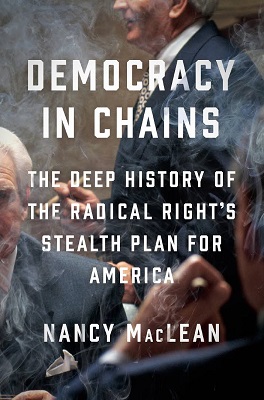by Hartmut Kliemt
Nancy MacLean’s book Democracy in Chains (Viking 2017, henceforth “DIC”) informs a surprised academic public to whom such a thought never would have occurred without her creativity that the late James M. Buchanan has throughout his academic career been the intellectual master-mind of a stealth plan to subvert American democracy. The Nobel committee and all friends of Buchanan must be grateful that Ms. MacLean could overcome the restraints of ordinary decency to make her way into the private study of James M. Buchanan shortly after his death. To her knowing eye “the papers revealed … that Buchanan had realized the value of stealth long ago, while still trying to influence Virginia politicians” (DIC, XX) and induced billionaire Charles Koch to do likewise with the “movement” he funded.
Professor MacLean goes on (same page): “The irony haunted me as I systematically worked my way through the piles of papers in Buchanan’s personal office and then moved on to the cabinets filled with documents that revealed virtually every step in the evolution of his ideas and associations. I was able to do so because Koch’s team had since moved on to a vast new command-and-control facility at George Mason called the Mercatus Center, leaving Buchanan house largely untended. Future-oriented, Koch’s men … gave no thought to the fate of the historical trail they left unguarded. And thus, a movement that prided itself, even congratulated itself, on its ability to carry out a revolution below the radar of prying eyes (especially those of reporters) had failed to lock one crucial door: the front door to a house that let an academic archive rat like me, operating on a vague hunch, into the mind of the man who started it all.” (CIC, XX-XXI)
Nancy MacLean herself notes the complete lack of professional archive work on Buchanan’s personal letters and files. But why then did she not register the fact that she was not dealing with “documented documents,” which necessarily must undermine the credibility of her own work unless she can provide some reliable documentation? In keeping with her own style we must wonder whether she pinched documents and made unauthorized photo copies. Perhaps she could share them with the rest of us. If so, her house of cards would collapse immediately.
Hartmut Kliemt is a professor of philosophy and economics at the Frankfurt School of Finance and Management. He is also an adjunct research associate of the Center for the Study of Public Choice at George Mason University, where he taught courses in “economic philosophy” jointly with James M. Buchanan, for whose collected works he is also the co-editor.


READER COMMENTS
Steve Horwitz
Jul 14 2017 at 3:29pm
Well THAT’S gonna leave a mark. Ouch.
David R. Henderson
Jul 14 2017 at 5:00pm
MacLean writes:
And thus, a movement that prided itself, even congratulated itself, on its ability to carry out a revolution below the radar of prying eyes (especially those of reporters) had failed to lock one crucial door: the front door to a house that let an academic archive rat like me, operating on a vague hunch, into the mind of the man who started it all.” (emphasis added)
She can’t literally mean this, right? Is she saying that she entered without permission because the door was unlocked?
Jon Murphy
Jul 14 2017 at 6:21pm
I was able to do so because Koch’s team had since moved on to a vast new command-and-control facility at George Mason called the Mercatus Center, leaving Buchanan house largely untended
I love my home at the Mercatus Center, but it’s not quite so dramatic as she makes it sound. This was a good laugh
Anon
Jul 14 2017 at 8:02pm
[Comment removed for supplying false email address. Email the webmaster@econlib.org to request restoring this comment and your comment privileges. A valid email address is required to post comments on EconLog and EconTalk.–Econlib Ed.]
foobarista
Jul 15 2017 at 2:07am
First rule of “democracy”: it’s only a democracy if the Democrats win, and the bureaucracy expands.
The more bureaucracy, the more democracy. Any other option is fascism! Especially if those control-freak statist libertarians are involved, and emphatically if their oil-soaked paymasters are in the loop.
Now, tech and finance billionaires are the spirit guides of the common man, with direct windows into their very souls. And they’re firmly democrats as long as they’re Democrats.
David O'Rear
Jul 17 2017 at 9:54am
[Comment removed. Please consult our comment policies and check your email for explanation.–Econlib Ed.]
Hazel Meade
Jul 17 2017 at 10:22am
Apparently “Democracy” means “as much power as possible is concentrated in the federal government”. People ruling themselves via voluntary associations – not democracy. Voting every few years for a representative and president that control as much as possible – that’s REAL democracy. And any attempt to resist the latter in favor of the former is a secret plot to destroy democracy.
Rob Thorpe
Jul 17 2017 at 5:52pm
“… gave no thought to the fate of the historical trail they left unguarded”
I think it would be wise for GMU to invest a bit more in security.
Cyril Morong
Jul 22 2017 at 7:52am
Just to show how polarizing this book is, 60% of the reviewers at Amazon give it a 5 and 32% give it a 1. That has to be very unusual for any book
Comments are closed.